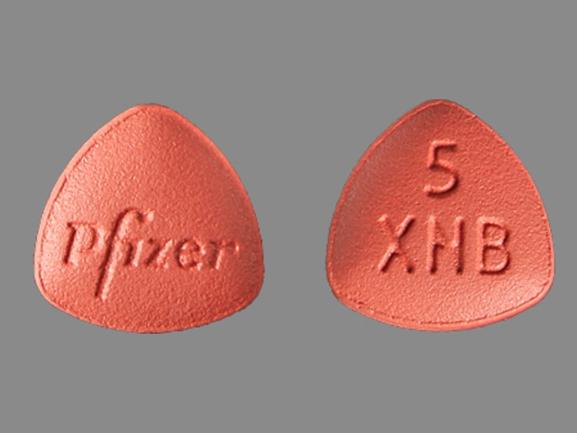Inlyta and Alcohol/Food Interactions
There are 3 alcohol/food/lifestyle interactions with Inlyta (axitinib).
Nicotine Axitinib
Moderate Drug Interaction
MONITOR: Smoking cessation may lead to elevated plasma concentrations and enhanced pharmacologic effects of drugs that are substrates of CYP450 1A2 (and possibly CYP450 1A1) and/or certain drugs with a narrow therapeutic index (e.g., flecainide, pentazocine). One proposed mechanism is related to the loss of CYP450 1A2 and 1A1 induction by polycyclic aromatic hydrocarbons in tobacco smoke; when smoking cessation agents are initiated and smoking stops, the metabolism of certain drugs may decrease leading to increased plasma concentrations. The mechanism by which smoking cessation affects narrow therapeutic index drugs that are not known substrates of CYP450 1A2 or 1A1 is unknown. The clinical significance of this interaction is unknown as clinical data are lacking.
MANAGEMENT: Until more information is available, caution is advisable if smoking cessation agents are used concomitantly with drugs that are substrates of CYP450 1A2 or 1A1 and/or those with a narrow therapeutic range. Patients receiving smoking cessation agents may require periodic dose adjustments and closer clinical and laboratory monitoring of medications that are substrates of CYP450 1A2 or 1A1.
References (4)
- (2024) "Product Information. Cytisine (cytisinicline)." Consilient Health Ltd
- jeong sh, Newcombe D, sheridan j, Tingle M (2015) "Pharmacokinetics of cytisine, an a4 b2 nicotinic receptor partial agonist, in healthy smokers following a single dose." Drug Test Anal, 7, p. 475-82
- Vaughan DP, Beckett AH, Robbie DS (1976) "The influence of smoking on the intersubject variation in pentazocine elimination." Br J Clin Pharmacol, 3, p. 279-83
- Zevin S, Benowitz NL (1999) "Drug interactions with tobacco smoking: an update" Clin Pharmacokinet, 36, p. 425-38
Axitinib Food/Lifestyle
Moderate Food Interaction
GENERALLY AVOID: Grapefruit juice may increase the plasma concentrations of axitinib. The proposed mechanism is inhibition of CYP450 3A4-mediated first-pass metabolism in the gut wall by certain compounds present in grapefruit.
MANAGEMENT: Patients treated with axitinib should avoid consumption of grapefruit, grapefruit juice, and any supplement containing grapefruit extract. Axitinib may be administered with or without food.
References (1)
- (2012) "Product Information. Inlyta (axitinib)." Pfizer U.S. Pharmaceuticals Group
Switch to consumer interaction data
Axitinib High Blood Pressure (Hypertension)
Moderate Potential Hazard, Moderate plausibility
axitinib - hypertension
The use of axitinib may causes hypertension. Blood pressure should be well-controlled prior to initiating axitinib and treated as needed with standard anti-hypertensive therapy. It is recommended to reduce the dose in case of persistent hypertension despite use of anti-hypertensive medications and to discontinue therapy if hypertension is severe and persistent despite these measures. Discontinuation of therapy should be considered if there is evidence of hypertensive crisis. Close monitoring is recommended.
References (1)
- (2012) "Product Information. Inlyta (axitinib)." Pfizer U.S. Pharmaceuticals Group
Switch to consumer interaction data
Inlyta drug interactions
There are 253 drug interactions with Inlyta (axitinib).
Inlyta disease interactions
There are 11 disease interactions with Inlyta (axitinib) which include:
- hemorrhagic events
- cardiac failure
- GI perforation
- hepatic impairment
- hypertension
- proteinuria
- renal impairment
- RPL syndrome
- thromboembolism
- thyroid dysfunction
- lung toxicity
More about Inlyta (axitinib)
- Inlyta consumer information
- Check interactions
- Compare alternatives
- Pricing & coupons
- Reviews (1)
- Drug images
- Side effects
- Dosage information
- During pregnancy
- FDA approval history
- Drug class: multikinase inhibitors
- Breastfeeding
- En español
Related treatment guides
Drug Interaction Classification
| Highly clinically significant. Avoid combinations; the risk of the interaction outweighs the benefit. | |
| Moderately clinically significant. Usually avoid combinations; use it only under special circumstances. | |
| Minimally clinically significant. Minimize risk; assess risk and consider an alternative drug, take steps to circumvent the interaction risk and/or institute a monitoring plan. | |
| No interaction information available. |
See also:
Further information
Always consult your healthcare provider to ensure the information displayed on this page applies to your personal circumstances.


